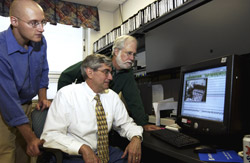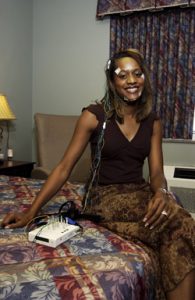
TUSCALOOSA, Ala. – Counting sheep as a way to doze off may be a cliché, but statistics show that millions of Americans suffer from insomnia and struggle to get a good night’s sleep.
Sleep disorder researchers at The University of Alabama say that having insomnia does not mean you must rely on sleeping pills. They are beginning the Sleep Research Project aimed at helping people end their dependence on sleeping pills. The five-year treatment study is funded with a $2.7 million grant from the National Institute on Drug Abuse.
This research project is designed to help people who are dependent or addicted to sleep medication and want to stop using the pills. Information gained from the long-term study could possibly help anyone who has ever suffered a sleepless night.
Dr. Kenneth Lichstein, professor and chair of the UA psychology department, is a national expert on sleep disorders and is directing the project. Dr. Sid Nau, research scientist in the UA psychology department, is the project associate director.
The UA Sleep Research Project is looking for volunteers between the ages of 21-65 who frequently take prescription medicine to help them sleep and who are continuing to have frequent difficulty sleeping. Volunteers must also have their doctor’s permission to participate. The treatment study is aimed at helping people end their dependence on prescription medication for insomnia.
All who qualify for the study will receive a thorough screening for sleep disorders at no charge, they will be given insomnia treatment at no cost, and they will receive $300 for participating.
The study is being conducted by the UA psychology department and two accredited sleep disorders centers. Participants can be seen in Tuscaloosa or Birmingham. Collaborating investigators include Dr. James Geyer, medical director of the Tuscaloosa Sleep Disorders Laboratory in DCH Regional Medical Center and Dr. Robert Doekel, medical director of the Sleep Disorders Center of Alabama in Birmingham.
Insomniacs are more likely to be female or older adults, but they can be almost anyone with 20-35 percent of the U.S. population experiencing some degree of insomnia, Lichstein says.
Some 30 million people, or around 10-15 percent of the population in this country, suffer from chronic insomnia, Lichstein explains. Chronic insomnia is when a person has trouble falling asleep or staying asleep three times a week for at least six months, he said. Chronic insomnia is more common in women and older adults.
Among those who suffer from chronic insomnia, Lichstein estimates that there are about 1.5 million people who chronically use medication to help them sleep. “$1 billion a year is spent on prescription and over-the-counter sleep medications,” he notes.

The UA treatment study will help participants decrease their dependency on sleep medication. Participants will be weaned off the medication and will be helped to do this through behavior therapy, Lichstein explained. In addition to Lichstein, Nau and a participant coordinator, several UA graduate students will assist with the project. Study participants will spend some time in a sleep lab in Tuscaloosa or Birmingham.
Lichstein has served on the editorial board of a number of journals including the Journal of Consulting and Clinical Psychology, Behavior Therapy and Sleep. He is the founding editor of Behavioral Sleep Medicine. He has published more than 100 journal articles and book chapters, and four books.
For more information about the study, contact the researchers toll free at 1-877-210-9723, www.sleepresearchproject.ua.edu.
* * *
The Sleep Research Project Web site offers sleep tips in its Better Sleep Advice section. It includes an “Ask the Sleep Doctor” interactive question-answer feature. The public can ask questions about their sleeping problems and concerns. The informative and helpful Web site also features Better Sleep Tips and Children’s Sleep Advice.
The Web site advice offers suggestions to promote better sleep, including:
- Bedtime should be fairly regular
- Limit caffeine and avoid caffeine within eight hours of bedtime
- Avoid nicotine within one hour of bedtime
- Avoid alcohol within four-six hours of bedtime
- Avoid stressful or demanding activities late in the evening
- A routine set of behaviors before bedtime can have a soothing affect
- Hunger disturbs sleep; a light bedtime snack may help
- Avoid looking at the clock when trying to sleep
- Staying in bed for a long period of time can work against you
- A consistent sleep schedule and wake time is helpful
- Naps are risky for anyone with trouble sleeping
- A steady, daily amount of exercise probably deepens sleep
- Worry about sleep is one of the main enemies of sleep
Although their current study focuses on adults, Lichstein and Nau add that it is important to teach children good sleep habits. Their Web site recommends:
- Keep a fairly regular schedule for children’s’ bedtimes and wake times
- Be consistent in bedtime routines; in early years a bedtime story and in later years, reading or a quiet activity can serve as a cue for sleep
- From the first, encourage children to fall asleep in their own bed on their own
- Follow your own advice and pay attention to getting the amount of sleep you need to feel and function well during the day
Contact
Linda Hill, UA Media Relations, 205/348-8325, lhill@ur.ua.edu
Source
Dr. Kenneth Lichstein, lichstein@ua.eduDr. Sid Nau, snau@as.ua.edu, UA Sleep Research Project,toll free 1-877-210-9723, sleep.research@ua.edu